#Discourse Analysis
Explore tagged Tumblr posts
Text
YWFTW#2 and the Positivity Sandwich (long post)
The scene begins with optimism. Ed is rightly showing off his fish framed inside a combat narrative reinforcing his developing confidence. Ed’s body language - ‘behold!’ - also signifies self-assurance. Meanwhile, Stede’s positive nonverbal conversation cues are exquisite - his eye contact, facial expressions, and little gasps of delight build Ed’s self esteem further, and reinforce his absolute delight in Ed’s tale. Stede shows further interest by a follow-up question, ‘What are your plans for it?’ before positively reinforcing the rather obvious answer with, ‘I like that, good plan’.

We get verbal mirroring from Ed next which reinforces the pair’s intimacy - ‘I like that shirt.’ Stede’s positive praise allows Ed a way in to flirt, turning Stede’s language back around as a compliment. And Stede plays along, with a verbal callback, ‘This new thing?’, because they are in tune with knowing which memory is playing in both their minds as they stand in the moonlight.
Ed continues to pull at that memory telling Stede, ‘You wear fine things well’, cementing the phrase in their couples lexicon. The repeating of it here, this time by Ed, and Stede’s clear understanding of the significance, reinforces where they both pinpoint the beginnings of the romantic stirrings of their relationship.
We then get the kiss that never happened the first time, and it’s beautiful. But we then get a tone shift as we realise they are not quite on the same page.

Stede deepens the kiss whilst Ed stiffens and pulls away. This is the beginning of a more cautious part of their conversation. After so much positive body language, and lexical mirroring and callback, their language become disjointed and unsettled.
There are a number of overlapping and unfinished sentences:
Ed: Can we take it ssssslow? Stede: Yeah. Sorry. I didn’t… I wasn’t thinking… Ed: No, it’s alright…. I just need to… um…[clears throat] Stede: No, I know.
Ed: [Big sigh]
Broken sentences and hedging don’t seem to be going anywhere as they both scramble for mental purchase. Ed also uses a number of nonverbal fillers to signify discomfort - throat clearing, sighing, long pauses. And ‘Can we take it slow?’ is so tentatively asked it signifies Ed’s continued struggle with agency.
The next part of the scene subverts much of the positive features of the first section. Ed again uses a phrase from their couples lexicon, as he did with YWFTW to initiate the kiss, but this time to slow Stede down. He tells him they’re both ‘whim-prone’ as Stede said, and this time Stede’s nonverbal conversational cues become negative. There is no eye contact, and his face falls at his words being used to block their relationship progress, and he remains completely silent as Ed says ‘sometimes it’s nice just to be patient and wait’.

In a further subversion, Ed latches on to the fish he’s holding, not now as a tale of triumph, but one of caution. We’ve seen time and again Ed thinks best in metaphor, and he has clearly learned something about himself on the boat today with Fang. But Ed still isn’t fully clear what his needs are. When Stede asks if Ed is ‘the fish’, Ed says ‘We’re the fish…’ suggesting he still has doubts over whether Stede wants to be caught. But then he descends into hedging again: ‘I guess. Maybe. I think…’. Ed still lacks confidence and clarity in expressing what is causing him to hesitate, he just knows what he feels.
And Stede is amazing because he doesn’t push any further. The veil of sorrow covering his face lifts into a ‘Huh.. okay…’ And this is where we get the positivity sandwich because Stede now takes the conversation and finds a way to lead it back again, layering the cautious part of their conversation between two positive interactions.
Stede takes Ed’s hand tentatively asking ‘Is this alright?’, but he allows Ed the agency of completing the handhold fully. Stede then waits to see what Ed will do next, and smiles with such affection as he admires Stede’s hand and place his own on top, adjusting the position with care. Now at what point this becomes a game is unclear, but I think Stede now putting his hand on top certainly indicates playfulness. Neither speaks, but Stede’s nonverbal cues are again exquisitely reassuring as Ed now cottons on to what is happening by raising a finger; Stede mirrors with a thumb, and Ed tilts his head and bests him.
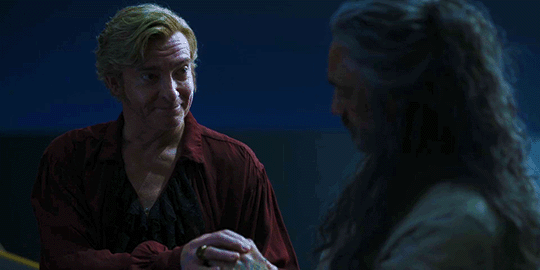
It’s symbolic of the conversation at the start when they mirrored and synced up. The game shows Ed he’s been heard and Stede isn’t upset. It’s an example of how much they can be in tune with each other in the right circumstances (‘We can be a lighthouse’). And Stede’s pitch-perfect ‘You won’ with all its layers of meaning reinforces the positivity with which the interaction concludes after the wobbly middle, allowing them to walk away together happily in relaxed conversation.
#ed teach#stede bonnet#positivity#discourse analysis#the curse of the seafaring life#ywftw2#gentlebeard#long post#ofmd meta#ofmd
61 notes
·
View notes
Text
Every once in a while, I find myself returning to two core texts: The Body in Pain: The Making and Unmaking of the World by Elaine Scarry and the essay A Dangerous Individual by Michel Foucault.
..........
In the Body in Pain, Scarry explores the relationship between physical pain, language, and power. Her central argument is that pain is uniquely difficult to express and, as a result, it isolates individuals. Pain has a destructive capacity—it can unmake a person's world, reducing them to a state where communication fails. Conversely, creativity and expression have the power to remake the world, to construct shared meaning.
Scarry also delves into how pain is used as a tool of power—most explicitly in contexts like torture. For her, torture is the deliberate unmaking of a person's world, an extreme form of control and domination. The inexpressibility of pain, its resistance to language, becomes a means through which authority asserts itself.
Foucault's essay A Dangerous Individual explores the relationship between power, knowledge, and the concept of the "criminal" or "deviant." His analysis is rooted in the idea that society defines and categorizes individuals to regulate behavior, creating and controlling "dangerous" identities. This labeling process is a method of discipline that extends beyond the legal system into broader cultural and social norms.
Foucault sees power not merely as repressive but as productive—it generates knowledge, shapes identities, and constructs norms. The "dangerous individual" becomes a category through which power operates, justifying surveillance and control. Foucault also connects this to the management of the body, arguing that the body is a site where power is exercised and inscribed.
#michel foucault#elaine scarry#the body in pain#philosophy#the dangerous individual#discourse analysis#linguistics#language
8 notes
·
View notes
Text
because i teach discourse analysis i get a little obsessive about speech acts and speech act theory.
just a couple of days ago my sister was ironing her shirts and she asked me if i want her to iron mine.
I'm middle eastern so I said no, but fully expecting her to iron them.
refusing the invitation at first is a politeness strategy in this culture, expecting the other person to make the invitation a second time, then you would accept.
if i was ironing, i wouldn't even ask her if she wants her shirts ironed, I'd iron them anyway. second, if she refused, I'd iron them anyways too.
#I'm not blaming her it's just a communication failure#since we live in syria without 24/7 power I just ironed at 10.30 pm#discourse analysis#you could blame me because I don't need to use a politeness strategy and i should've just said yes#it's a demonstration of how communication works#she didn't infer my intended meaning because i flouted the maxim of quality in order to be polite#despite the fact that i shouldn't be talking to my little sister like this
5 notes
·
View notes
Text
Wrote a really kick ass paper on medical discourse around cochlear implants and how it's negatively affecting sign languages
Will this be the first one I can get published??? I hope
4 notes
·
View notes
Text
Saul Newman - The Politics of Postanarchism
The Politics of Postanarchism Saul Newman In recent years radical politics has been faced with a number of new challenges, not least of which has been the reemergence of the aggressive, authoritarian state in its new paradigm of security and bio-politics. The ‘war on terror’ serves as the latest guise for the aggressive reassertion of the principle state sovereignty, beyond the traditional limits…
#anarchism#antagonistic nature of social and political relations#anti-globalization movement#autonomy of the political#bare life#bio-politics#Class is therefore no longer the central category through which radical political subjectivity is defined#classical anarchism#complicity of the subject in power#constructed nature of social reality#contingency of history#discourse analysis#discursive understanding of social reality#economic reductionist framework of Marxism#Enlightenment humanism#essentialism#genealogical view of history#Giorgio Agamben#homo sacer#humanist discourse#incommensurability of difference#indeterminacy of identity#indeterminacy of the structure itself#indeterminacy of the subject#instability and plurality of identity#Jacques Lacan#Max Stirner#non-essentialist politics#opacity of the social#post-Marxism
3 notes
·
View notes
Text
discourse analysis can suck my balls
#discourse analysis is the bane of my existence#i mean i love studying english and i get it’s important but god at what cost#i’m in the trenches#look i enjoy debating semantics just as much as the next person but multiple discourse analysis assignments in a row? are you kidding me?#and they’re for different modules too#english major#discourse analysis
3 notes
·
View notes
Text
Scholarship can make a significant contribution to enlightenment, yet ‘scholarship’ needs to take a stance and express itself in comprehensible ways, in many different public spheres and via different genres of text and talk.
Ruth Wodak (Interviewed by Andreas Schulz)
#academia#scholarship#discourse#discourse analysis#critical discourse analysis#sociolinguistics#academics#critical linguistics#dark academia
2 notes
·
View notes
Text
People are finally getting what means "Discourse analysis", one of the most fascinating themes from Linguistics.
Further reading authors as: Pêcheux, Orlandi, Chauí, Althusser, Foucault (mah fave dude!) , Fairclough, Gregolin, Possenti, van Dijk and that french guy Maingueneau, who wrote about how media discourse was being used to shape a reality defined by the US propaganda (we also call this fucked up reality as "capitalism") to explain WTF media does these atrocious headlines.
There is a REASON and WHY they do headlines like that.
Fascism and capitalism walks hand by hand every single moment in our History, language as one of the most precious mistress.
Read more:
https://en.wikipedia.org/wiki/Critical_discourse_analysis?wprov=sfla1
Academics are studying about this language phenomenon since the very Aristotle, I'm happy to knowledge FINALLY people are noticing these nuances and WHAT??
Go ahead people, the revolution started!
“You simply cannot fit more America into a single incident than a man dying a horrifying death in protest of war crimes while a first responder screams at cops to stop pointing their guns at him and go get fire extinguishers. If you were to pick a single moment in history to sum up the essence and expression of the US empire, that would be it.”
Caitlin Johnstone, The Most American Thing That Has Ever Happened
45K notes
·
View notes
Text
Gender Centrism, Distance Travelled and the Discursive Construction of Non-Binary Identity: Binary and Non-Binary Trans Acceptance in Queer-Accepting Campus Social Settings - A Tumblr-Originating Theory Paper
Mallory Minerva 2025 Recommended Chicago author-date citation: Mallory Minerva. 2025. Gender Centrism, Distance Travelled and the Discursive Construction of Non-Binary Identity: Binary and Non-Binary Trans Acceptance in Queer-Accepting Campus Social Settings - A Tumblr-Originating Theory Paper. Tumblr. In text: (Mallory 2025)
Positionality Statement
I am a binary trans woman on HRT. I am strongly opposed to transmedicalism, but more saliently I am resoundingly supportive of non-binary people and their right to craft and assert their own narratives. I wish for all trans people to have our own narratives and analysis of ourselves canonized, as the general understanding, especially in academia, of us is not created by or for us. However, the experiential aspects of narrativizing one's own non-binary identity is foreign to me as I am not non-binary. The time I was non-binary for a week before my egg cracked does not count. I also will recognize the fact that I write about binaryness and non-binaryness, as well as cisness and transness, as binary oppositions, which is a colonial imposition that I have internalized.
Introduction
I am at a university where a lot of people have two sets of pronouns, and frankly is very queer. A relatively low percentage of students (meaning, not the overwhelming majority but probably still more than two thirds) are fully cis, so there is a big culture here of non-binary acceptance since so many people, especially in some departments, are at least slightly non-binary. This means that there is a curious situation of non-binary acceptance outpacing binary trans acceptance.
This variance in acceptance is mostly evidenced through language, such as pervasiveness of they/them pronouns being used, such that non-binary people have an easier time being they/them'd than binary trans people have being she/her'd or he/him'd, receiving the "coward's they" (the covert misgendering of binary trans people using they/them pronouns) instead. There are other areas of evidence found through other disciplines such as communication studies and non-linguistic communication, or literally just asking people their opinions (Zimman & Brown, 2024) I am however approaching this from the standpoint of applied linguistics and discourse analysis to figure out the structure of people's theory of gender. My methods therefor are highly informal; drawing from observations I have made and theorizing about them.
Background
Historically non-binary acceptance has been behind binary trans acceptance. This is because while all trans people are a challenge to cisnormativity, binary trans people at least can be related to within the hegemony of the binary, while non-binary people have to carve out completely alternative narratives to cisgenderism. In a social setting where cisgenderism is not explicitly upheld, and is upheld only and inconsistently through implicit bias, there is a context where people do not try to die on the hill of cisnormativity, but still cisnormativity is often done. In particular, this is a social context where many students discover their own non-binaryness, and that is a context that is not fully ready for a complete undoing of cisgenderism.
Another factor that has aided binary trans acceptance is transmedicalism, which itself is a fairly hegemonic narrative due to being invented by influential cis sexologists (you know the ones). When trans people are also transsexual and pursue a normalizing transition rather than a queer transition, cisnormativity is appealed to. The decline of normalizing transition goals indicates a decline of not only transmedicalism but the cisnormativity and cis-male epistemological arrogance that spawned it. Non-binary people and especially gender-fluid people fail to fit this so much that they are still regularly left out of academic and especially psychological peer reviewed literature about medical transition and gender dysphoria. The idea that a trans person wouldn't want to pretend to be cis is alien to transmedicalists.
Now for my hypothesis. In many social settings such as relatively queer campuses, non-binary acceptance has flipped the script and outpaced binary trans acceptance. Instead of having to carve out twice as much theory contrary to cisgenderism in order to gain acceptance, a discursive construction of gender continuum has emerged, likely cisgender in origin, which seems to aid non-binary people specifically in acceptance. I believe this can be analyzed through discourse analysis and applied linguistics, which is beyond the scope of an essay that originated as an impulsive tumblr post. However I will explain why I think this emerged, and it does come from changes in how non-binary identity is discursively constructed within academic and campus culture.
Gender Centrism?
With the increased prevalence and visibility of non-binary people, which itself is not so much a natural progression but more hard-fought through activism and resilience by non-binary people, there is the need for binary people to confront and narrativize their unavoidable presence. Among non-binary people themselves, there is also the need to narrativize and analyze their own existence, relative to both binary cis people and binary trans people. Because of the need for non-binary people to carve out narrativization in the face of binary hegemony, this has in fact occurred in a variety of ways. While for many the narrativization is that non-binary people, as implied by the term non-binary, are in fact not binary, as in existing outside of it, a seemingly very common discursive construction of non-binary identity among binary people is actually the opposite.
Just as the binary itself is hegemonic, the hegemonic and normative way of understanding non-binary identity within social contexts of non-binary acceptance is to place non-binary people, not outside of the binary, but instead right in the middle of it. The content of this construction in its simplest form is that non-binary people are gender centrists. For example, AFAB non-binary people are seen as moving away from womanhood and towards manhood, but incompletely, landing somewhere in the middle of a spectrum. For AMAB non-binary people this applies analogously. The binary is upheld for anyone with a gender; non-binary people with non-fluid genders are more centrally located in the spectrum than their binary counterparts, and gender-fluid people move around in the spectrum. Binary people, cis or not, are on extreme ends. Agender people perhaps are the ones truly able to escape the binary in this discursive construction. Notably however, a key difference between this model and a totally cisnormative narrative is that the gender binary is a continuum or spectrum rather than a binary opposition. Additionally, it is decoupled from sex. When cis people conveying their allyship say that gender is a spectrum, they are likely providing evidence of their internalization or construction of this narrative.
I will not comment on the validity of this discursive construction (hereafter "gender centrism") as an accurate analysis of non-binary identity; I will leave non-binary people to this task. However I will point out that, empirically speaking, this does seem to be a real discursive construction that has developed in social settings with high non-binary acceptance, and it is likely the case that this discursive construction is most common with queer and allied cis people, possibly common with binary trans people, and probably uncommon but still occasional with non-binary people.
Transmedicalism and "Distance Travelled"
To understand how this explains the greater acceptance of non-binary people compared to binary trans people in social settings where this narrative occurs, it is necessary to understand the role of transmedicalism and transsexuality in it. First however there is another key detail of the gender centrism narrative. As the etymology of the morphemes trans and cis imply, transness is about moving to the other side of something, where cisness is about not doing that. Therefor trans people are thought to have moved our positions from a cis starting point to some other destination. With a continuum of gender that non-binary people are in the middle of, it follows that binary trans people have done the most movement, crossing from one extreme to another, where non-binary people have covered a lesser distance. What it means to cover distance relative to a cis starting point is effected by a few factors. Some clearer factors are pronouns, incidence of name-change, changes to stylized acts (Butler, 1988) and gendered technology usage, and so on; the more extreme the change, the less cis one is and the more ground is covered. In short, degree of transness is measured as distance travelled, and when non-binary people are seen as gender centrists, there is less distance travelled and so they are less trans.
Less obviously but probably most powerfully is transsexuality. Because the gender centrism narrative is still somewhat cisnormative, naturally it would include undue emphasis on biological sex and its association with gender. This is somewhat understandable in a society that, even for trans people, values the embodiment of one's gender. Even I seek to embody my gender. Whether cisnormativity is so thoroughly imposed that many trans people seek gender embodiment as a goal (implying, probably correctly, that gender dysphoria has colonialism as a distal determinant) or that the etiology of transness is rooted in the seeking of gendered experiences including embodiment and anatomical experiences, or both, is not necessary here to be decided. It is the case that transsexuality is a common trans phenomenon, and correlates much more with binary trans people than non-binary people, such that HRT and other medical interventions are culturally ubiquitous binary trans symbols.
In a narrative where binary trans people are seen as literally more trans than non-binary trans people, due to a perceived greater distance travelled, and in a co-occurrence of transmedicalist vestiges where transsexuality symbolizes binary transness, medical transition becomes evidence of degree of transness. Changing one's gender embodiment is not quite the same as changing one's gender identity, and is rooted in cisnormativity (as all transmedicalism is). However the symbolization of medical transition gives evidence of distance travelled, and so transsexual trans people of any degree are thought to be more trans than trans people disinterested in medical transition. In fact, transsexuality is likely assumed to be a pre-requisite for a high enough degree of distance travelled necessary to no longer be a gender centrist and fully wrap around the horseshoe of gender.
Discussion
The explanation for how a gender centrism narrative, especially in the context of hegemonic transmedicalism which co-occurs with it, determines a greater acceptance for non-binary people compared to binary trans people, is that if non-binary people are analyzed as having a lower degree of transness, due to being narrativized as having less distance travelled relative to a cis starting point, both due to how non-binary identity is narrativized and how medical interventionism relative to gender is narrativized, then binary trans people are more trans and also that non-binary people are more cis. The greater degree of cisness that non-binary people can be narrativized with is evidenced by notions of AFAB non-binary people being "the girl ones" and other transphobic ideas. In a social context that is even just a little bit cisnormative, acceptance will correspond to cisness. Therefor, if non-binary people are seen as more cis than binary trans people such as in a gender-centrism narrative, they will have more acceptance.
The flip-side is that in situations where non-binary people are increasingly normalized via an assumed milder degree of transness, binary trans people may comparatively struggle with acceptance, or at least perceive a lesser degree of acceptance, compared to non-binary peers, while non-binary people may feel that their gender is invalidated due to being seen as more cis than they actually are. This makes analyzing the utility of the gender-centrism narrative complicated. Positive utility is identifiable. It probably is not of net detriment to binary trans acceptance and has coincided with increased trans acceptance all around since it does imagine a theory of gender that isn't just bioessentialist. Meanwhile it has seemingly helped or at least correlated with a rapid increase in non-binary acceptance, and can be found in social situations where singular they/them pronouns are remarkably common.
On the other hand this situation probably leads people to imagine non-binary identity as more cis than it actually is, which can manifest in treating non-binary people in ways that could either invalidate their genders through microaggressions, or at least fail to properly validate non-binary people. Alongside this as a negative consequence is binary trans people being seen as more extreme in our divergence from gender norms, slowing our acceptance, or even leading binary trans people to actually feel more trans than non-binary people as a product of bitterness, thus buying into the gender-centrism narrative. If a consequence is greater non-binary acceptance and widespread use of the singular they, there is also objectively the phenomenon of they/them being used so pervasively that the "coward's they" becomes socially acceptable, leading to more subtle forms of misgendering for binary trans people that are easy to get away with using plausible deniability and overcorrective language ideology.
In genealogizing the emergence of the gender-centrism narrative, actual Foucauldian Genealogical Analysis is beyond the scope of this tumblr post, but it is worth also recognizing that in the social settings where it has developed, non-binary people do seem to make up most trans people present. While there is a discursive analysis to be done for why there is sometimes greater non-binary acceptance than binary trans acceptance, it is also likely that non-binary people being more common forces acceptance to be created, and cis people uncomfortable with their own transphobia use the gender-centrism narrative to moderate their own acceptance, accepting non-binary people by rationalizing how they aren't as trans as transsexuals. Demographic shift in gender relative to covert and subconscious transphobia may be the historical explanation.
It is also possible that the gender-centrism narrative came first, still as cis creation to understand non-binary people as a then-edge-case, and this led prospective enbies to rationalize their own change of gender as less extreme and thus less daunting from an acceptability standpoint, in which case I feel very empathetic. I was non-binary before I was a trans woman because I felt less daunted since I felt I was travelling less distance. Even I may have internalized this narrative as an egg.
Conclusion
I will point back to my positionality statement and implore non-binary people to discuss and review my ideas, because as a binary trans person I cannot be fully confident in my analysis of non-binary identity, and I have too much imposer syndrome to fully stand by my discourse analysis, despite usually being the smartest person in the room when it comes to discourse analysis. I especially would like to recommend non-binary authors to engage in reflective writing, famously a "truly feminist" genre (Connolly, 2018), as a subversive academic modality for exploring how non-binary identity is discursively constructed in academic culture generally.
References
It's a lot easier to write a research paper in under two hours when you tell yourself that citations are colonizer bullshit!
Butler, Judith. "Performative Acts and Gender Constitution: An Essay in Phenomenology and Feminist Theory." (1988)
Connolly, Bríd. “Reflective Practice and the Feminist Lens: The Other Side.” (2018).
Zimman, Lal, and Cedar Brown. "Beyond Pronouns 101: Linguistic Advocacy for Trans-Inclusive Language in the College Classroom.", in Anne H. Charity Hudley, Christine Mallinson, and Mary Bucholtz (eds), Inclusion in Linguistics. (2024)
#gender theory#discourse analysis#cultural anthropology#gender studies#transgender studies#trans studies#trans#transgender#non binary#enby#theory#transmedicalism#tagging transmedicalism just to poke the truscum hornets nest#truscums DNI#research paper#applied linguistics#linguistics#sociolinguistics#name reveal I guess#I love ADHD#playing with genre and publishing convention here
0 notes
Text
What are your thoughts on the concept of living a very long life?
Daily writing promptWhat are your thoughts on the concept of living a very long life?View all responses What are your thoughts on the concept of living a very long life? A simplistic question in so many ways as so many definitions are needed. How long is long? 100 years? 200 years? Back to 1066 to watch the Battle of Hastings? 1588 to see the Spanish Armada sailing up the channel? 1815 to see…

View On WordPress
0 notes
Text
A Linguistic Analysis: Manga Translation (EN/JP/TWN) Comparison of Chapter 90.1 | Part 3
This is written in response to @connoisseursdecomfort's post Comparing Versions of Short Mission 11
((I realized that I should have just made this into a post because my response would be lost as a reblog. And it did... OTL
Also, this is an updated version with more insight/details))

Consider this is as a part 3 of my Linguistic Analysis posts on Spy x Family's Ch. 90.1 or Short Mission 11.
Part 1: A Linguistic Analysis of the Spelling "Ania" and "Anya"...
Part 2: "Ania" is the closest to an identity reveal
This analysis contains spoilers from Chapter 90.1 / Short Mission 11!
What's so interesting about the discourse analysis amongst Japanese, Taiwanese, and English translations is the hedging (word choices that lessen the directness of a dialogue) langauge that Loid uses. It is more clear in the Japanese ("by the way") and Taiwanese ("it came to mind") translations. Whereas, English's hedging is found in "...right?" What the three of them do share in common is that Loid's discourse is pointing to active voice by stating "your name is spelled A-N-Y-A". Apply all of these translations below:
(ENG) Your name is spelled A-N-Y-A, right?
(JP) By the way, your name is spelled A-N-Y-A.
(TW) It came to mind, your name is spelled A-N-Y-A.
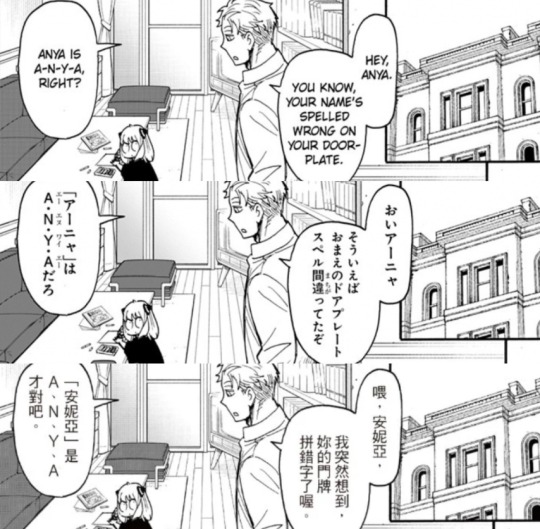
It is consistent that Loid's tone is holding authority by demonstrating his knowledge on Ostanian orthography based off the transcriptions he's seen of Anya's name registered as "A-N-Y-A" which was spelled by her previous Ostanian adopted parents. So Twilight feels confident that the spelling of her name MUST be "Anya."
Another thing I wanted to add on to @connoisseursdecomfort's observation is catching loss of translation, which is so unfortunately common. English translation omits translations mainly because some expressions or dialogue that are common in a language (Japanese and Taiwanese) would be perceive differently in English-speaking countries (USA, UK, AUS, CAN, etc.). This is called cultural discount.
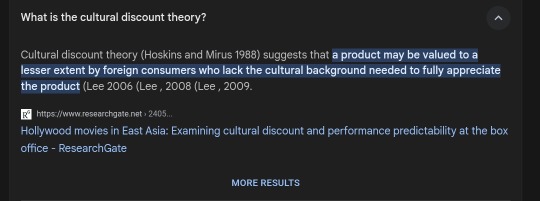

It's the reason why Squid Game English dub missed out on many jokes that are play on words in the Korean dub. It is also the reason why a lot of American jokes are not understood by non-English speakers OTL
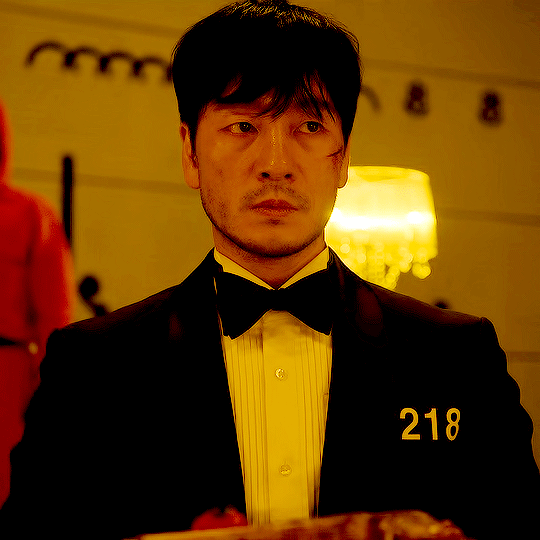
But this is a general phenomenon because English native consumers would find the expression strange simply because we do not have this style reflected in our discourse. The best example is when @_mika60 translated the omitted text "Anya's heart stirred at the mention of her own name."
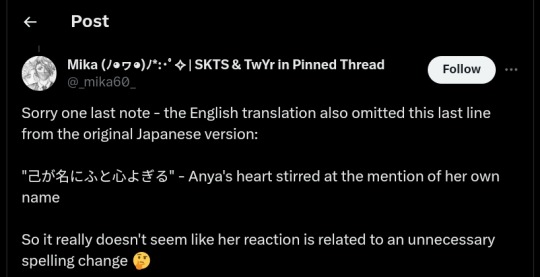
To an American (possibly English natives in general, but I can't really speak on behalf of British, Canadians, nor Australians beause their English may be slightly different in terms of cultural lifestyle/upbringing), this expression can be perceived as corny/purple-prosey. Because American discourse don't generally have this emotionally-charged reflective discourse. Hence, omitted. Which is unfortunate because it says so much about how Loid's spelling affected Anya's feelings. So this is a perfect example of cultural discount.
An example of loss in translation is the omission of Anya's text which explains why she can't carve out her name is due to feeling insecure about her bad handwriting. (Again, this is character analysis that English-reading consumers missed out on! Because anything written in the manga is deemed canon.) Whereas English, we completely omit that detail because English native speakers don't need that extra dialogue. The English discourse is typically straight to the point and English native consumers draw inferences from icons (images/illustrations).
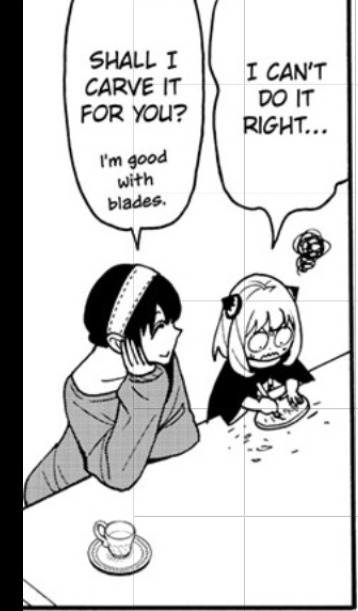
Based off my explanation, this is how I see the above picture as an American consumer (using a think-aloud method):
Anya says, "I can't do it right..." and she looks frustrated as illustrated by the swirl above her head.
Her brows are furrowed which supports that she's annoyed/frustrated/angry.
Her cheeks... are they blushes? Is she embarrassed? I can't really tell.
She's also a 4 y/o or was it 5 y/o child (she lied being 6, right?) so it's obvious she probably might be annoyed because she can't draw straight lines.
Because she's an infant, I'm sure she doesn't have the strength to draw clean lines.
Based off my thought process above, do I think OR am I convinced that Anya feels insecure? No.
Can it be argued that she's insecure? Yes, absolutely.
If I were to talk to someone who posits Anya may be insecure because of his/her knowledge of children behavior and/or mannerism, then I would be convinced. However, I would arrive to this assimilation through negotiating observations and exchanging knowledge of children behavioral mannerism. However, this would become more of headcanon if it wasn't explicitly stated in the manga (keep it mind that the Japanese translation DOES explicitly state that she's insecure because of her bad handwriting, so yes, it is canon that Anya is insecure of her bad handwriting).
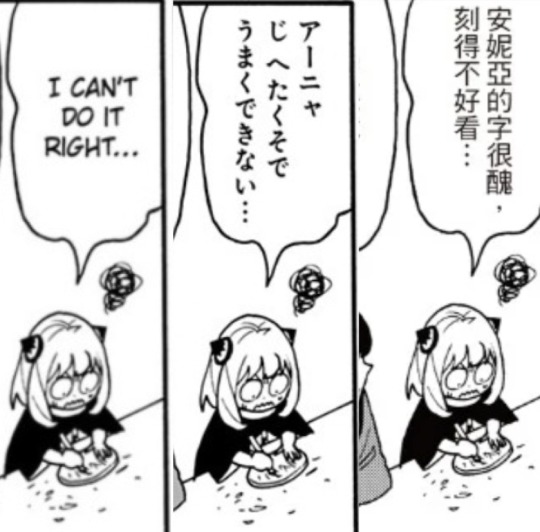
Anyways...
I love translation comparisons mainly because you get to experience cultural exchange if you are fortunate enough to understand or have access to a translator (*cough* @connoisseursdecomfort *cough*) who enjoys comparing multiple languages. Thank you for doing God's work @connoisseursdecomfort <3
#spy x family#spy x family spoiler#spy x family manga spoiler#spy x family chapter 90.1#short mission 11#loid forger#twilight#anya forger#sxf#analysis#linguistics#scarlywroteathing#updated analysis#discourse analysis#loss in translation#cultural discount
48 notes
·
View notes
Text
I agree about the opt-out button, and I also think that the boop-o-meter providing counts of boops sent/received also contributes to this. Like, you know that anyone who's enabled boops is most likely excited about seeing Number Go Up so you booping them is doing them a tiny favour and you don't have to second-guess the meta-message you're sending by booping someone because you know that they know you're also trying to make your Number Go Up.
Personally, I started off only booping my mutuals (booping the moots), but then a) I realized very quickly that it would be hard to get any badges that way and b) a lot of people were reblogging things about how they were booping everyone who crossed their dash so I started just booping and booping back people indiscriminately.
(Though I will say, as a fairly large blog that's been around for a while, my experience may not have been entirely typical as I did get all the way to BLR received yesterday so apologies if I wasn't able to boop you back. But even then it was still a well-designed experience and my activity feed didn't feel entirely overwhelmed with boops, it was just glorious chaos. I think the boop-o-meter converting to words/kaomoji after a bit also made it feel less competitive after a while.)
kind of interesting how the boop feature makes tumblr feel so much more active? like idk usually you see people reblogging stuff but you never know if that's a queue and you forget that there are real people behind the blogs. but if ur getting booped? somebody saw you and acknowledged your existence. wild.
#boop#linguistics#discourse analysis#seriously though i think this is a fascinating case study and i am happy to have been present for it#internet linguistics#language on the interwebz
13K notes
·
View notes
Text
Saul Newman - The Politics of Postanarchism
The Politics of Postanarchism Saul Newman In recent years radical politics has been faced with a number of new challenges, not least of which has been the reemergence of the aggressive, authoritarian state in its new paradigm of security and bio-politics. The ‘war on terror’ serves as the latest guise for the aggressive reassertion of the principle state sovereignty, beyond the traditional limits…
#anarchism#antagonistic nature of social and political relations#anti-globalization movement#autonomy of the political#bare life#bio-politics#Class is therefore no longer the central category through which radical political subjectivity is defined#classical anarchism#complicity of the subject in power#constructed nature of social reality#contingency of history#discourse analysis#discursive understanding of social reality#economic reductionist framework of Marxism#Enlightenment humanism#essentialism#genealogical view of history#Giorgio Agamben#homo sacer#humanist discourse#incommensurability of difference#indeterminacy of identity#indeterminacy of the structure itself#indeterminacy of the subject#instability and plurality of identity#Jacques Lacan#Max Stirner#non-essentialist politics#opacity of the social#post-Marxism
0 notes
Text
Social language-the varieties of language used for different purposes. The use of different varieties of language to enact and recognize different identities in different settings.
Discourses-ways of combining and integrating language actions and interactions, ways of thinking, believing , valuing, and using various symbols, tools and objects to enact a particular sort of socially recognizable identity.
Intertextuality-when one spoken or written text alludes to quotes or otherwise relates to another.
Conversation-all the talk and writing that has gone on in a specific social group or in society at large around a major theme, debate, or motif.
If it communicates a who and a what then an oral or written “utterance” has meaning .
Who=a socially-situated identity kind of person one is seeking to be and enact here and now. (can be multiple and they need not always be people)
What=is a socially situated practice or activity that the utterance helps to constitute or carry out.
You are who you are partly through what you are doing and what you are doing is partly recognized for what it by who is doing it..
To be a particular who and to pull off a particular what requires that we act value, interaction, and use language in sync with or in coordination with other people and with various object(props) in appropriate locations and at appropriate times.
0 notes
Text
خطاب السّياسة الخارجيّة الأمريكيّة في سياق صفقة القرن
خطاب السّياسة الخارجيّة الأمريكيّة في سياق صفقة القرن خطاب السّياسة الخارجيّة الأمريكيّة في سياق صفقة القرن الكاتب : أبو حمَّاد إبراهيم الملخَّص: تناقش هذه الدراسة الموسوم�� ب ” خطاب السّياسة الخارجيّة الأمريكيّة تجاه الحقوق الفلسطينية في سياق صفقة القرن” في مبحثين: تناول المبحث الأول خطاب السياسة الخارجية الأمريكية تجاه الثوابت الفلسطينية في سياق صفقة القرن، ويفحص المبحث الثاني خطاب التفاعلات…
#American foreign policy#Discourse analysis#the deal of the century.#the Palestinian rights. ; تحليل الخطاب#الحقوق الفلسطينية.#السياسة الخارجية الأمريكية.#صفقة القرن.
0 notes
Text
خطاب السّياسة الخارجيّة الأمريكيّة في سياق صفقة القرن
خطاب السّياسة الخارجيّة الأمريكيّة في سياق صفقة القرن خطاب السّياسة الخارجيّة الأمريكيّة في سياق صفقة القرن الكاتب : أبو حمَّاد إبراهيم الملخَّص: تناقش هذه الدراسة الموسومة ب ” خطاب السّياسة الخارجيّة الأمريكيّة تجاه الحقوق الفلسطينية في سياق صفقة القرن” في مبحثين: تناول المبحث الأول خطاب السياسة الخارجية الأمريكية تجاه الثوابت الفلسطينية في سياق صفقة القرن، ويفحص المبحث الثاني خطاب التفاعلات…
#American foreign policy#Discourse analysis#the deal of the century.#the Palestinian rights. ; تحليل الخطاب#الحقوق الفلسطينية.#السياسة الخارجية الأمريكية.#صفقة القرن.
0 notes